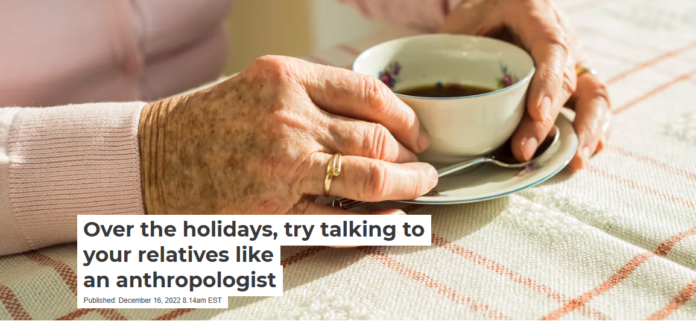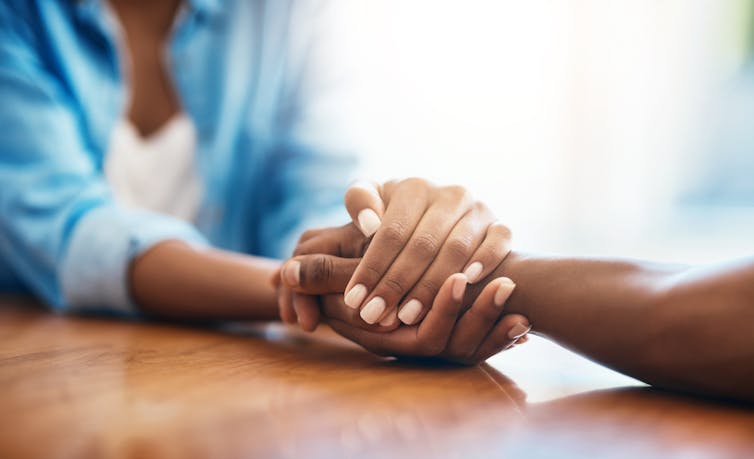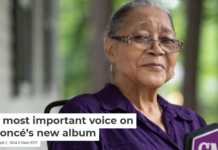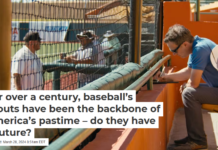

Elizabeth Keating, The University of Texas at Austin College of Liberal Arts
How is it possible to spend so much time with your parents and grandparents and not really know them?
This question has puzzled me as an anthropologist. It’s especially relevant for the holiday season, when millions of people travel to spend time with their families.
When my parents were alive, I traveled long distances to be with them. We had the usual conversations: what the kids were doing, how the job was going, aches and pains. It wasn’t until after my parents died, though, that I wondered whether I really knew them in a deep, rich and nuanced way. And I realized that I’d never asked them about the formative periods of their lives, their childhoods and teenage years.
What had I missed? How had this happened?
In fact, I had interviewed my mother a few years before her death. But I only asked her about other relatives – people I was curious about because my father’s job had taken us to places away from the rest of the family. I based my questions for my mother on the bit of information I already had, to build a family tree. You might say I didn’t know what I didn’t know.
I decided to research the kinds of questions that would have elicited from my mother things about her life that I had no clue about and that now remain hidden and lost forever. I interviewed older people to develop questions that would paint a vivid picture of a person’s life as a child and teenager. I wanted details that would help me see the world that had influenced the person they became.
So I used my training as an anthropologist to ask the type of questions an anthropologist would ask when trying to understand a way of life or culture they know little about. Anthropologists want to see the world from another person’s point of view, through a new lens. The answers I got from older people opened whole new worlds for me.
Probing the mundane
One secret to having a deep conversation with your elders when you’re together over the holidays is to set aside your customary role. Forget, for the space of the interview, about your role as their grandchild or child, niece or nephew, and think like an anthropologist.
Most genealogical inquiries concentrate on the big life events like births, deaths and marriages, or building a family tree.
But anthropologists want to know about ordinary life: interactions with neighbors, how the passage of time was experienced, objects that were important to them, what children were afraid of, what courtship practices were like, parenting styles and more.
When you ask about social life, you’ll get descriptions that paint a picture of what it was like to be a child figuring things out back then – when, for instance, as one relative explained, “Unless you were told to go and say hello to Grandma, you never just, as a child, spoke to adults.”
On the other hand, when you ask about important objects, you’ll hear about those tangible things that pass from generation to generation in your family that are vessels of value. These ordinary things can convey stories about family life, just as this person who grew up in the U.K. describes:
“Mum used to say to me that the best part of the day was me coming home from school, coming in the back door and sitting on the stool in the kitchen and just talking, a mother-daughter thing. I’ve still got that stool from the kitchen. My father built it in evening classes. My children remember sitting on the stool in the kitchen, too, while Grandma was baking, passing time, drinking cups of tea and eating shortbread.”
My interview subject, now a grandparent herself, had a hard time understanding the fascination young people have with the social worlds contained in their phones.
But on the topic of phones, I found there can also be unexpected points of connection across generations. When I asked one grandparent about the home she grew up in, as she was visualizing her home in rural South Dakota, she suddenly remembered the telephone they had, a “party line” phone, which was common in the U.S. back then.
All the families in the area shared one phone line, and you were supposed to only pick up the phone when you heard your family’s special ring – a certain number of rings. But as she told it, her mother’s connection to the community was greatly expanded even then by telephone technology:
“We had a phone, and it was on a party line. And you know, we would have our ring, and of course, you’d hear the other rings too. And then sometimes, my mom would sneak it and lift up the receiver to see what was going on.”

‘All you have to do is ask’
I enjoyed the interviews with older people so much that I gave my students at the University of Texas at Austin the assignment to interview their grandparents. They ended up having exhilarating, interesting and generation-bridging conversations.
Their experiences, along with mine, led me to write a guide for people wanting to learn more about their parents’ and grandparents’ early lives, to protect a part of family history that is precious and easily lost.
Grandparents are often lonely and feel no one listens or takes what they have to say seriously. I found out that this can be because many of us don’t know how to start a conversation that gives them a chance to talk about the vast knowledge and experience they have.
By taking the position of an anthropologist, my students were able to step out of their familiar frame of reference and see the world as older generations did. One student even told the class that after interviewing her grandmother, she wished she could have been a young person in her grandmother’s time.
Often, the tales of “ordinary” life relayed to my students by their older relatives seemed anything but ordinary. They included going to schools segregated by race, women needing a man to accompany them in order to be allowed into a pub or restaurant, and leaving school in the sixth grade to work on the family farm.
Time and again, grandparents said some version of “no one’s asked me these questions before.”
When I was first developing the right questions to ask older family members, I asked one of my research participants to interview her elderly mother about daily life when she was a child. Toward the end of that interview, she said to her mother, “I never knew this stuff before.”
In response, her 92-year-old mother said, “All you have to do is just ask.”
Elizabeth Keating, Professor of Anthropology, The University of Texas at Austin College of Liberal Arts
This article is republished from The Conversation under a Creative Commons license. Read the original article.



















